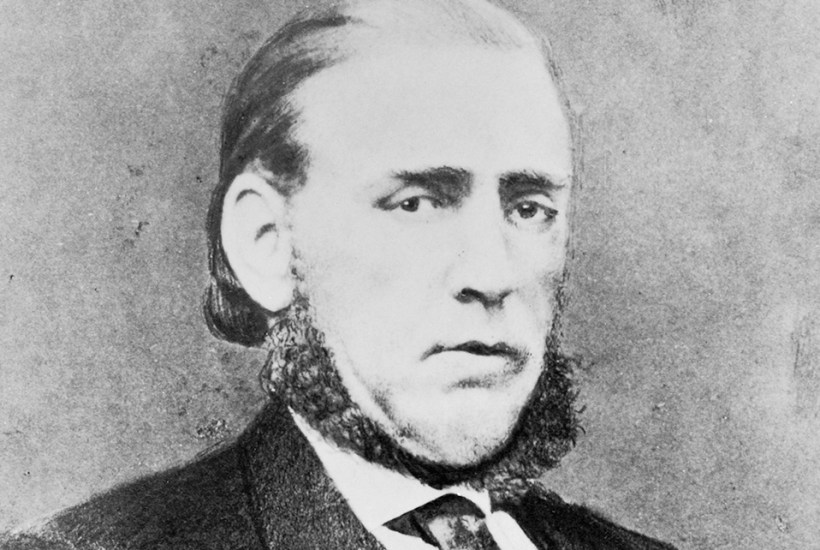‘Is this all that these modern ladies’ novels are to be about? People?’ So asks the bewildered author of Old St Paul’s, The Lancashire Witches, The Tower of London and three dozen other forgotten blockbusters stacked with costumed folderol. In Zadie Smith’s sixth novel, William Harrison Ainsworth disapproves, in 1871, of hiscousin-housekeeper, Eliza Touchet, reading a nameless story of dull village folk with ‘no adventure, no drama, no murder’. It can only be George Eliot’s Middlemarch.
The Fraud alights briefly on this quarrel, as it does on many Victorian topics. Yet Smith’s triple-pronged tale of imposture and masquerade, public lies and secret truths, often reverts to fiction’s role either as gaudy stage for the ‘human comedy’ or mirror for the hidden spirit. A person, muses Eliza, may be ‘a bottomless thing’, and ‘12 lifetimes too brief a spell in which to love a single soul’. To find ‘ultimate reality’, ‘the door opened inwards’.
But such a character as Arthur Orton, a.k.a. Tom Castro – the obese Wapping butcher who in 1866 returned from Australia claiming to be Sir Roger Tichborne, heir to a grand title and estate – might elude even Eliot’s subtle pen. His door opens on to a void. Fleshly but hollow, that gross actor may demand the antic theatricality of the predatory ‘vampire’ who stalks this novel – Charles Dickens. Since her debut, White Teeth, Smith has sought in fiction and essays to embrace both Eliot and Dickens people: layered souls and painted marionettes. In this, her first period novel, each claims a day, or year, in court.
Seen through the caustic gaze of the Scots, Catholic (but discreetly bisexual) Eliza, Ainsworth’s career makes up one suit in Smith’s deck. It runs from his prodigious heyday as a Kilburn celebrity in the 1830s, outselling Oliver Twist with his footpad romp Jack Sheppard, to his decline into a ‘whiskery, jowly, dejected, old man’, his fustian romances mocked and his female household – Eliza, three daughters and pert second wife, Sarah – mutinous.
The unfolding of the Tichborne Claimant’s case, as this ‘tragicomedy of obscene length’ transfixes the public and improbably channels a people’s revolt (‘He’s for us and we’re for him’, adds another). Crucially, Smith deals a third hand. Its ace is the historical figure of Andrew Bogle, an inscrutable Jamaican servant of the Tichbornes, born enslaved, who became the Claimant’s manager. Bogle, too, has felt like a ‘well-fed fraud, with a home and a hearth’ in Tichborne service. Yet his island’s ‘trough of blood’ washes through his tortured dreams.
‘People lie to themselves all the time,’ as the Claimant’s cockney crowds of true believers prove. To Bogle, Victorian Britain appears as a fraudulent pantomime built on the cruelty and theft of slavery and empire. He remembers Little Johanna, a herbalist and prophetess on the Hope Estate in Jamaica. Punished on the plantation treadmill, she came to see that manufactory of fear and pain as ‘the secret engine of the world’. For all its ebullient mood, The Fraud agrees.
The novel spans a century, from Bogle’s family backstory in the 1770s through 1830s’ literary feuds to the ‘comic carnival’ of the Claimant’s marathon trials. Smith, though, shuffles her cards skilfully. She lays them out in brief, mostly shortwinded chapters. No prolix exposition, Ainsworth-style, here (cheekily, she quotes the old bore’s blether). These narrative gyrations keep the pace brisk but can confuse. Saturnine, charismatic Bogle, meanwhile, threatens to commandeer the ship. His nightmarish Jamaican recollections, or observations of raucous England with its ‘wild struggle of factions’, have the pulse and heft to fuel a novel of their own. Eliza, the ageing outsider ‘with no definition in the world’, inevitably tries to befriend the multiply estranged Bogle – a fathomless enigma with a life in ‘cipher’. Wisely, Smith refuses any sentimental, ‘inter-sectional’ handshakes.
One of Dr Johnson’s lawyer chums tried to be a philosopher but ‘cheerfulness was always breaking in’. Even in slavery’s shadow, that goes for Smith’s fiction. The Fraud has big-hearted fun from first to last: with Ainsworth himself, a ninny and fusspot but a lovable soul; with the bitchery and flattery (‘butter me and I’ll butter you’) of the early Victorian literary scene, its port-swilling popinjays mostly doomed to penury and oblivion (that bloodsucker Dickens aside); with the Tichborne courtroom farce and the superbly shameless Claimant. ‘Wouldn’t a fraud make more of an effort to convince?’ Eliza thinks. So did Orton-Castro’s legion of champions.
‘I draw; it becomes reality,’ boasts the caricaturist George Cruikshank during one of Ainsworth’s bibulous evenings in idyllic Kilburn. In The Fraud, that’s not quite so. Smith wants us to admire the artifice and artistry behind her period decor. She relishes the gags and greasepaint of this antique drollery and knows full well that most fiction springs from ‘worn cloth and stolen truth’. Then Bogle and Eliza remind us of the mystery behind the puppetry. Smith’s work often swings between those poles. Here, again, two kinds of fictional people tug her talent in rival directions. Despite, or because of, this inner tussle, she remains – in all respects – the real thing.
Got something to add? Join the discussion and comment below.
Get 10 issues for just $10
Subscribe to The Spectator Australia today for the next 10 magazine issues, plus full online access, for just $10.
You might disagree with half of it, but you’ll enjoy reading all of it. Try your first month for free, then just $2 a week for the remainder of your first year.








Comments
Don't miss out
Join the conversation with other Spectator Australia readers. Subscribe to leave a comment.
SUBSCRIBEAlready a subscriber? Log in